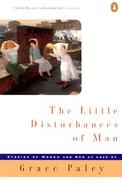Little Disturbances of Man
- List Price: $16.00
- Binding: Paperback
- Publisher: Penguin USA
- Publish date: 08/01/1994
Product notice
Returnable at the third party seller's discretion and may come without consumable supplements like access codes, CD's, or workbooks.
| Seller | Condition | Comments | Price |
|
More Than Words
|
Good |
$1.11
|
|
Valleys Books & More
|
Acceptable |
$1.76
|
|
Goodwill
|
Good
|
$2.08
|
|
Dream Books Co.
|
Good
|
$3.13
|
|
Copper News Book Store
|
Good
|
$3.36
|
|
HPB Inc.
|
Very Good
|
$3.37
|
|
HPB-Ruby
|
Very Good
|
$3.93
|
|
Wonder Book - Member ABAA/ILAB
|
Good |
$4.38
|
|
Big River Books
|
Very Good |
$4.50
|
|
Ergodebooks
|
Good |
$4.78
|
|
HPB Inc.
|
Very Good
|
$5.11
|
|
HPB-Ruby
|
Very Good
|
$5.38
|
|
HPB Inc.
|
Very Good
|
$5.38
|
|
ARC Foundation Thrift Store
|
Good |
$5.57
|
|
HPB-Diamond
|
Very Good
|
$6.73
|
|
Half Price Books Inc
|
Very Good
|
$6.73
|
|
Book Alley
|
Good
|
$7.31
|
|
Sixth Chamber Inc.
|
Very Good
|
$8.98
|
|
Beck's Books of Sacramento
|
Like New |
$9.00
|
|
Best and Fastest Books
|
Acceptable |
$9.40
|
|
upickbooks/Daisy Li
|
New
|
$12.00
|
|
SurplusTextSeller
|
New |
$14.92
|
|
Ergodebooks
|
New |
$15.95
|
|
Book Culture Inc.
|
New |
$18.00
|

Please Wait

